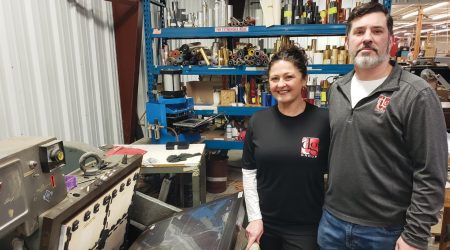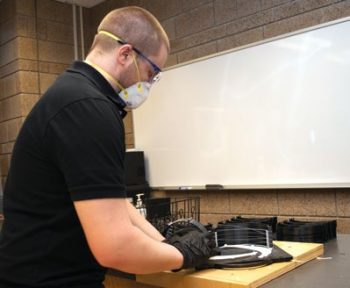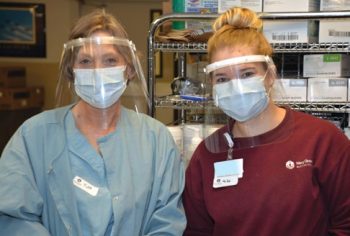
The call came toward the end of March. The state of Iowa was projecting that it would come up at least 500,000 face shields short of what was needed to provide front-line medical workers with personal protective equipment in the battle against COVID-19.
Would Adam Gold be willing to help?
Gold, president of The Dimensional Group, a Mason City custom packaging company, soon found himself in a flurry of CIRAS-arranged calls, emails, and meetings. A plan quickly formed to pair Gold’s company, which had no previous experience producing medical equipment, with Ottumwa-based Angstrom Precision Molding. Within two months, the team would produce more than 1.3 million medical face shields.
“To go from nothing to shipping product in eight or ten days, that is something that never happens,” Gold said. “There were a lot of late-night phone calls and everybody coming at it with the right attitude. . . . I don’t think you can understate the importance of CIRAS on the front end of this.”
“CIRAS started this whole process,” said Jim Johnson, Angstrom’s chief operating officer. “You pushed us in the right direction.”
Throughout the initial outbreak of COVID-19, the role CIRAS played in addressing Iowa’s PPE crisis focused largely on moving obstacles out of manufacturers’ ways. Acting on behalf of Iowa State University, CIRAS experts spent much of March and April reaching out to factories in an attempt to bridge gaps, streamline processes, and support companies’ efforts to use their capabilities in new ways.
As the pandemic’s economic disruption took hold, CIRAS built lists of who was able to make what and shared that information with organizations needing new suppliers.
Chris Hill, director of the CIRAS Technology Assistance Program, worked with multiple companies to provide design assistance and smooth the path into face shield production.
One outgrowth of those calls was the new venture involving The Dimensional Group, which had experience cutting plastic, and Angstrom Precision Molding, a plastic-injection molder who agreed to make the halo headpieces to which clear face shields attach. In other instances, CIRAS helped companies purchase raw material or used technologies from the Digital Manufacturing Lab powered by Alliant Energy to help firms create the tooling they would need to gear up large-scale production quickly.
“I think everyone understood there was a need,” Hill said. “But when you’re a business in the middle of a downturn, making an investment to do something new can be difficult. CIRAS worked to reduce that risk.”

While factories were gearing up, CIRAS joined Iowa State University’s mechanical engineering department in using campus 3D printers to produce nearly 1,000 face shields for local hospitals and care facilities. Those shields later would be distributed to nursing homes, emergency management officials, and the Veterans Administration hospital in Des Moines.
Allen Meyer, of Iowa’s Department of Administrative Services, said the emergence of Iowa PPE producers helped the state fill shortages more quickly and more cost effectively than other options.
“And of course,” Meyer said, “I always like putting Iowans back to work.”
Homegrown PPE production came at just the right time for Linda Doyle, CEO of Northcrest Community retirement center in Ames. CIRAS dropped 100 university-printed halos and 250 clear shields at the nursing home in mid-April, when infections were mounting across the country and PPE supplies were scarce.
“Having those shields available was just a real comfort,” Doyle said. “It was great to know that somebody out there cared about us.”

Sue Draper, director of supply chain management for Mary Greeley Medical Center in Ames, praised CIRAS as a source of quality information during the pandemic. The hospital received donated face shields from the campus production effort and purchased additional shields from some of the companies that worked with CIRAS. Draper said she later alerted a regional hospital association to the CIRAS list of potential emergency suppliers.
“This has been really collaborative, and we’re very grateful,” Draper said. “It’s good to know your website is there. We don’t know what the fall is going to bring.”
For Iowa manufacturers, other questions remain.
After helping Iowa meet the state’s original face shield needs, The Dimensional Group and Angstrom spent May and June evaluating their long-term prospects in the medical supply business. CIRAS has plans to work with the companies on possible future design iterations, and Gold already has begun working with distributors to determine whether their product will remain viable over time.
Johnson, of Angstrom, said both companies got into the PPE business largely to be helpful. But the new normal may end up meaning they have a new business.
“I know we’re cheaper than China,” Johnson said of his competitors. “So, it might be possible that we could help keep some of this stuff being made in the United States.
“Hopefully, two years from now, it’ll turn out that you’ll be doing a bigger story on us.”
For more information, contact Chris Hill at chhill@iastate.edu or 515-313-8251.
A version of this article was published in the Summer 2020 edition of CIRAS News. To read more of that edition or others, please explore elsewhere on our website.